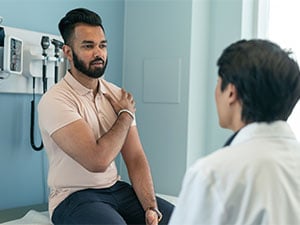Pancoast Tumor Signs and Symptoms

A Pancoast tumor, or superior sulcus tumor, is a relatively uncommon type of non-small cell lung cancer that develops in the uppermost part of a lung (apex) near the chest wall. As the tumor progresses, it may begin to pressure or invade nearby structures, which include the ribs and several major nerves and blood vessels.
Because Pancoast tumors form near many vital structures in the chest cavity, their surgical removal can be challenging. In addition to surgery, treatment may involve chemotherapy or radiation therapy.
What are some early warning signs of a Pancoast tumor?
Although Pancoast tumors are often caused by smoking, the early warning signs may not include coughing, wheezing, shortness of breath and other respiratory symptoms commonly associated with lung cancer. Instead, the earliest symptoms are often related to nerve compression, which can occur as a growing Pancoast tumor presses on a nerve that supplies the shoulder and arm, such as the brachial plexus.


#1 Cancer Hospital in Florida
Schedule an AppointmentWhat does a Pancoast tumor feel like?
In many cases, the first sign of a Pancoast tumor is a sharp pain in the shoulder or arm, which can be persistent and may worsen at night. The pain may be felt in the shoulder joint, in the inner arm or along the path of the ulnar nerve on the pinky side of the arm. Other symptoms of a Pancoast tumor that can be felt include numbness, muscle weakness and tingling sensations in the arm or hand.
Pancoast tumor symptoms tend to appear on the affected side of the body. For instance, a Pancoast tumor in the right lung may produce symptoms that affect the right side of the body.
What does a Pancoast tumor look like?
A possible visible sign of a Pancoast tumor is Horner syndrome, a relatively rare neurological condition that affects the eye and the surrounding tissues on one side of the face. Horner syndrome may occur if a Pancoast tumor disrupts the pathway of the sympathetic nerves that connect the brainstem to the eyes and face and control the body’s “fight or flight” response.
The symptoms of Horner syndrome, which usually affect only one side of the face, can include:
- Drooping of the upper eyelid (ptosis)
- Constricted pupil (miosis), resulting in mismatched pupil sizes
- Decreased sweating on the face (anhidrosis)
- Facial flushing

What are some symptoms of an advanced Pancoast tumor?
As a Pancoast tumor advances, the symptoms typically worsen and may include:
- Intense shoulder pain that extends to the shoulder blade
- Severe shoulder pain that radiates through the arm and wrist
- Pain in the neck and upper ribs
- Tightness in the chest
- Swelling in the upper arm
- Loss of dexterity in the hand and fingers
- Unexplained fatigue
- Unintended weight loss
Frequently asked questions (FAQs) about Pancoast tumor signs and symptoms
The following FAQs-related article provides additional information about Pancoast tumor signs and symptoms:

Benefit from world-class care at Moffitt Cancer Center
As a high-volume cancer center with specialists who focus exclusively on diagnosing and treating all types of lung cancer, Moffitt offers an unrivaled level of expertise. The multispecialty team in our nationally acclaimed Thoracic Oncology Program leverages leading-edge techniques and technologies to accurately diagnose Pancoast tumors and create individualized treatment plans, and we consistently achieve outcomes that exceed the national averages. Furthermore, to recognize our commitment to conducting groundbreaking research and robust clinical trials, the National Cancer Institute has distinguished Moffitt as the only Comprehensive Cancer Center based in Florida.
If you would like to learn more about the signs and symptoms of Pancoast tumors, you can request an appointment with a specialist in our Thoracic Oncology Program by calling 1-888-663-3488 or submitting a new patient registration form online. We do not require referrals.
